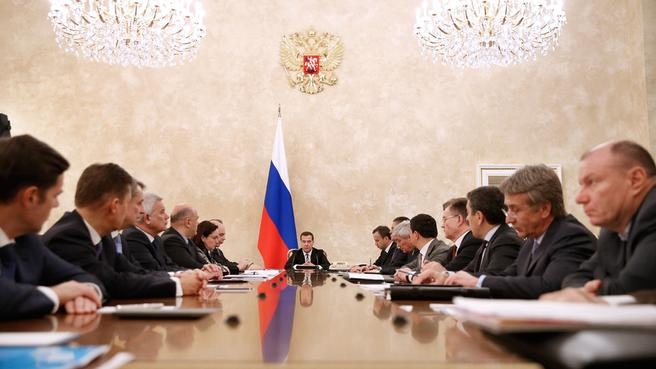Introductory remarks by Dmitry Medvedev:
Good afternoon, ladies and gentlemen. We are meeting today to discuss the current economic situation, bearing in mind that it is largely connected with the biggest exporting companies.
First of all, regarding the state of our currency market. This is not the first time we have encountered sharp currency fluctuations. We have experience in anti-crisis solutions. Yesterday, I held a meeting on the financial and economic situation. We are planning to make a number of critical decisions, including higher bank currency refinancing and ensuring a balance of currency supply and demand by increasing currency liquidity, if necessary. Nevertheless, everyone recognises that the rouble is undervalued today. Its exchange rate is no longer based on fundamental indicators and does not reflect the state of the economy. Needless to say, the problems and challenges we have encountered are connected to two well-known principal factors that are beyond our country’s control: a protracted fall in the price of oil and other commodities and the negative foreign political impact – I mean sanctions. Previously available for us international financial markets are now effectively off limits to our banks and companies. Naturally, the rouble cannot but react to that, but the figures that we have been seeing at currency exchange outlets in the past several days are out of sync with the objective picture and have moved outside the range that is comfortable for the economy and the people. Emotions have also been a factor here.
It is in our interest to put our currency market back on track. Nobody needs such instability: neither our people nor the banks or industry . But at the same time it is counterproductive to introduce excessively tough regulation in this sphere, which was used in the past, but it cannot bring any good results. We proceed from the premise that our future actions should be based on market mechanisms.
The Central Bank and the Government have
worked out a package of measures to stabilise the situation. We will act in a
coordinated way here. What we are seeing today is mostly playing on emotions.
Naturally, some companies have to service their foreign debt, while others have
to buy equipment abroad, and in these conditions concerns about hard currency
purchases are generally understandable. But at the same time, we should operate
on the assumption that purchasing hard currency in the present situation often
means purchasing it at an unfavourable rate.
There is something else I would like to say in opening our meeting: You know that there are enough currency resources in the country to achieve all the economic and production goals that you have set. There are also essential market instruments to ensure appropriate demand.
Today, we will discuss ways of acting together more effectively in this situation. Following the discussion, I will make the necessary decisions.
<…>












